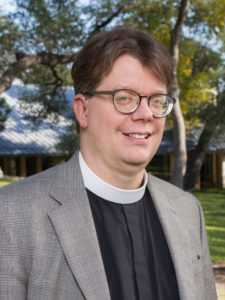Over the past several years the Holy Spirit has been moving through the Seminary of the Southwest community. The Spirit has been drawing people together in a conspiracy of hope that the long history of racial injustice in America and the church may cease and a new time of truth-telling, justice, healing, and reconciliation may move into its place.
I am writing this blog just days before Dr. Catherine Meeks of the Absalom Jones for Racial Healing begins a yearlong series on racial healing with our students preparing for ordained ministry. The purpose of these sessions is to guide our students into how to have brave conversations about race in our church and the world. All people in this country need healing from the sin of racism that has taken such deep roots in our land. The Gospel of Jesus Christ has something to say about finding healing from racism and our work with Dr. Meeks will help our students articulate this as they move more fully into their vocations. As a parallel process, the seminary faculty will also be engaged in several conversations with Dr. Meeks as they also seek to move more deeply into their own understanding of how to challenge racism in their work.
This work at Seminary of the Southwest is not new but one more turning of the wheel. In the wake of the protests over the killing of Michael Brown in Ferguson, Missouri in 2014 and the election of Presiding Bishop Michael Curry in 2015, it was clear this community would be drawn into deeper grappling with race in American society and the Episcopal Church. The events of Ferguson showed race could not be a secondary issue for those training for ministry. And Presiding Bishop Curry made clear that his tenure would involve a focus on racial reconciliation. There was a word being spoken to the church that Southwest would heed.
A symbolic response to this was the Blandy Lecture by Bryan Stevenson of the Equal Justice Initiative in the fall semester of 2016. This event, held at the University of Texas because of demand, galvanized the Southwest community to begin thinking more critically about racial justice and the crisis of mass incarceration. Motivated by the vision of Presiding Bishop Curry, in 2018 the seminary engaged in a partnership with the Black Religious Scholars Group, led by Dr. Stacey Floyd Thomas of Vanderbilt Divinity School, to create a visiting professor program where a Black scholar in a field of theological studies would be with us for a year. This person would teach and engage with the life of the community, especially as it concerned issues of race. Now in its third year, we are pleased to have the Rev. Yolanda Norton faithfully journeying with us in this work.
Part of the vision of Dr. Thomas was for the BRSG program to foster courageous conversations with the seminary community concerning race. Each year we have refined this process based on feedback. These conversations have not always been easy and a predominantly white institution like Seminary of the Southwest has had to adjust and perceive issues and dynamics that previously it did not see. And yet, we continue to travel this road, learning lessons from the past in order to create space for deeper and truer encounters.
This is what life in the Spirit is like. There is not a straight path when it comes to growing into truth and love. As we go on this journey we discover that the straight line of our assumptions is more like the spirals of a leaf blown on the breath of God. We are being drawn closer and closer to a way of being the Beloved Community. But community is always a thing that is in the process of becoming. We yearn and hope for God to make things right. As the Letter to the Hebrews says, hope is the expression of faith in things not yet seen. We strive towards the hope for healing of our divisions and for the end of trauma and harm caused by racism in this country and our church. The Spirit pulls us along as we strive in faith towards this hope, being taken to places we could not imagine. My hope for this year at Seminary of the Southwest is that we are drawn by the Spirit into a deeper way of speaking the truth and acting in love both within this community and for the communities we call home.
This fall, the Sowing Holy Questions blog will focus on issues of racial healing. Writers will reflect on what has been done, what change ought to happen, and offer visions for healing in our communities.

The Rev. Daniel Joslyn-Siemiatkoski, PhD, joined the faculty as the Duncalf-Villavoso Professor of Church History in 2014, having taught for a decade at other Episcopal seminaries. In 2020, he was appointed Dean of Community Life. His teaching focuses on integrating Anglican and Episcopal identity with the broader sweep of Christian history and Jewish-Christian relations. His research interests include Anglican and Episcopal history, Jewish-Christian relations ancient and modern, the development of Anglican ecclesiology, and comparative theology. He is the author of The More Torah, The More Light: A Christian Commentary on Mishnah Avot and Christian Memories of the Maccabean Martyrs and has authored chapters in various edited volumes and articles in Anglican Theological Review and Anglican and Episcopal History. Professor Joslyn-Siemiatkoski is a representative for The Episcopal Church in the Anglican-Roman Catholic U.S.A. dialogue group and a member of the board of trustees for the Episcopal Evangelism Society and the Historical Society of the Episcopal Church. He serves as an assisting priest at St. David’s Episcopal Church in Austin.


